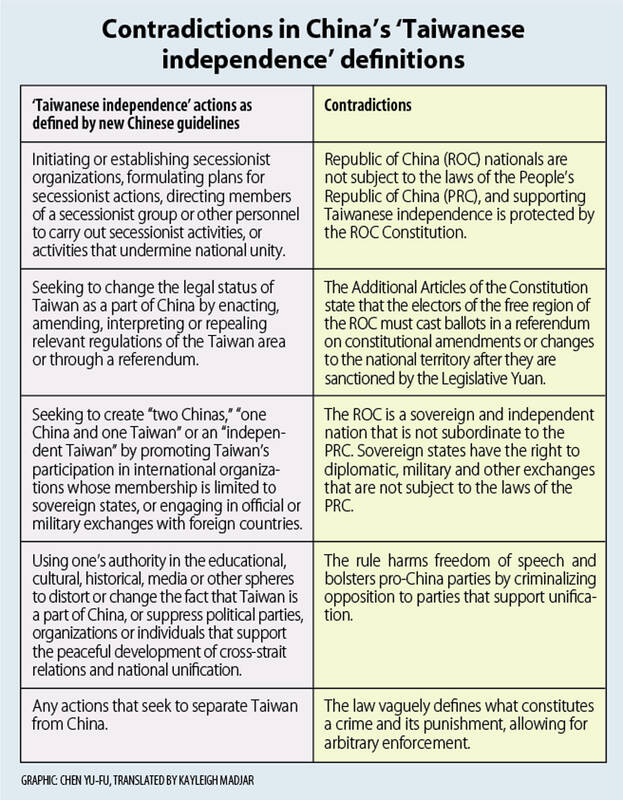Taiwan should appeal to the international community to show that China’s guidelines threatening the use of the death penalty against Taiwanese independence supporters violates the spirit of the UN charter and human rights, academics said yesterday.
China on Friday issued new guidelines to “severely punish Taiwanese independence diehards for splitting the country and inciting secession,” including the use of the death penalty in “particularly serious” cases. Crimes worthy of punishment include promoting “two Chinas,” “one China, one Taiwan” or “Taiwanese independence.”
At a forum in Taipei held by the Association of Chinese Elite Leadership, association research fellow Wang Chih-sheng (王智盛) said the guidelines are comparable to Hong Kong’s National Security Law, as they allow China to conduct trials in absentia for any behavior it deems to “split the state.”

That means Taiwanese who travel or transfer in China, Hong Kong or Macau, or take a Chinese airline, would put themselves at risk of being arrested by Chinese authorities, Wang said.
Even campaigning for Taiwan to join international organizations is considered an offense under the guidelines, such as when Deputy Legislative Speaker Johnny Chiang (江啟臣) last month traveled to Geneva, Switzerland, to advocate for Taiwan’s participation in the 77th World Health Assembly, he said.
The guidelines are part of a long-prepared strategy for Beijing to weaponize its judiciary to criminalize Taiwanese independence and deter advocates with elaborately devised rules, Prospect Foundation vice president Raymond Sung (宋承恩) said, adding that the guidelines follow Beijing’s remark on May 21 that President William Lai’s (賴清德) inaugural speech was his “confession of Taiwanese independence.”
Whether Taiwanese traveling overseas would be arrested and extradited to China for trial depends on whether China can exercise the illicit jurisdiction it asserts in other countries, Sung said.
Many nations suspended extradition agreements with China when it began to prosecute and imprison Hong Kongers for political reasons under Hong Kong’s National Security Law, he said.
The government should argue to the international community that China’s guidelines contravene international law, including its illicit expansion of extraterritorial jurisdiction and human rights violations by incriminating individuals for their speech or political opinions, he said.
Taiwanese should be careful of the 65 countries that have treaties on mutual legal assistance in criminal matters with China, Taiwan Thinktank researcher Wu Se-chih (吳瑟致) said.
This does not automatically mean those countries would necessarily extradite Taiwanese to China, but the risk is higher in some African, Middle Eastern and Southeast Asian countries, Wu said, adding that Tibet independence activists had been repatriated to China by the Thai and Malaysian governments.
The Straits Exchange Foundation has received 84 reports of personal security incidents from January to May, he said, adding that Taiwanese should avoid traveling to China, Hong Kong or Macau as the territories would enforce the guidelines.
Allowing trials in absentia is clearly at odds with the spirit of the UN Charter, and Chinese President Xi Jinping (習近平), who approved the guidelines, is the one seeking to tear apart the cross-strait relationship, Taiwan Association of University Professors chairman Chen Li-fu (陳俐甫) said.
The government should ban travel agency tours to China and tell people not to transfer flights in China, Hong Kong or Macau, as they could be arrested there, he said.

Taiwanese can file complaints with the Tourism Administration to report travel agencies if their activities caused termination of a person’s citizenship, Mainland Affairs Council Minister Chiu Chui-cheng (邱垂正) said yesterday, after a podcaster highlighted a case in which a person’s citizenship was canceled for receiving a single-use Chinese passport to enter Russia. The council is aware of incidents in which people who signed up through Chinese travel agencies for tours of Russia were told they could obtain Russian visas and fast-track border clearance, Chiu told reporters on the sidelines of an event in Taipei. However, the travel agencies actually applied

Japanese footwear brand Onitsuka Tiger today issued a public apology and said it has suspended an employee amid allegations that the staff member discriminated against a Vietnamese customer at its Taipei 101 store. Posting on the social media platform Threads yesterday, a user said that an employee at the store said that “those shoes are very expensive” when her friend, who is a migrant worker from Vietnam, asked for assistance. The employee then ignored her until she asked again, to which she replied: "We don't have a size 37." The post had amassed nearly 26,000 likes and 916 comments as of this

New measures aimed at making Taiwan more attractive to foreign professionals came into effect this month, the National Development Council said yesterday. Among the changes, international students at Taiwanese universities would be able to work in Taiwan without a work permit in the two years after they graduate, explainer materials provided by the council said. In addition, foreign nationals who graduated from one of the world’s top 200 universities within the past five years can also apply for a two-year open work permit. Previously, those graduates would have needed to apply for a work permit using point-based criteria or have a Taiwanese company

The Shilin District Prosecutors’ Office yesterday indicted two Taiwanese and issued a wanted notice for Pete Liu (劉作虎), founder of Shenzhen-based smartphone manufacturer OnePlus Technology Co (萬普拉斯科技), for allegedly contravening the Act Governing Relations Between the People of the Taiwan Area and the Mainland Area (臺灣地區與大陸地區人民關係條例) by poaching 70 engineers in Taiwan. Liu allegedly traveled to Taiwan at the end of 2014 and met with a Taiwanese man surnamed Lin (林) to discuss establishing a mobile software research and development (R&D) team in Taiwan, prosecutors said. Without approval from the government, Lin, following Liu’s instructions, recruited more than 70 software